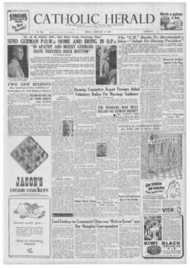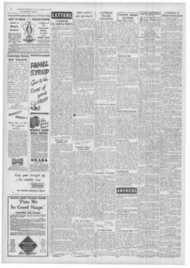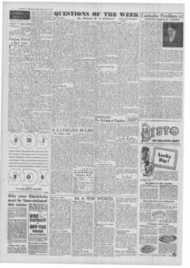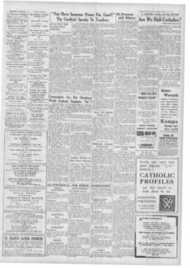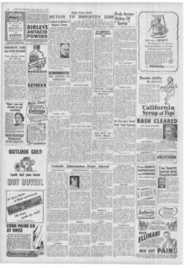Page 4, 14th February 1947
Page 4

Report an error
Noticed an error on this page?If you've noticed an error in this article please click here to report it.
Tags
Share
Related articles
" Italy And The War Mind"
All Sorts Begins The
Barbara Baftclay Carter
'the World Needs Saints" Says A Protestant Theologian
The Liturgy And The People Communion Outside Mass
[Catholic . Profiles: 921 BARBARA BARCLAY CARTgR S HE was born in
one of those lovely places under the bluest of skies whose names, as your eyes roam over a map of California, seem to swell into a mighty and glorious Litany of Saints so that on reaching the last of them to the North, Santa Rosa, you want to raise your head and invoke et °nines sancti et sanclae. From her birthplace, the old mission town of Santa Barbara, she takes her name. and friends of Barbara Barclay Carter like to chide her on the pre-natal influence the patron saint of bombardiers and artillerymen must have had in the forming of one side of her character — the side which is so pronounced when she is indefatigably fighting in a cause she has made her own. Yet, there is, too, that other side of her being which might have derived from the spirit of the lovable saint whose sons, pioneering for Christ in the wilderness of the New World, strung their mission churches like beads of -a rosary on the cantina real, His Catholic Majesty's highway, leading into the still wilder North. For never has lame dog or stray eat, hungry robin or tired cart-horse had a better, a more unquestioning, friend than her. The bees who some years ago swarmed into the tiny garden in Chepstow Villas, and there found a sister and a home, must have known about this Franciscan trait. Nor will you go none if you guess that these samples from the animal kingdom may also metaphorically represent members of God's great and s aried human family. In such cases she is sometimes a bit of a trial to friends less willing to put miserableness and helplessness on a par with worthiness every time. Or, who believe that even in the best of causes the emotional approach is not always the most impressive and that the heart must at times listen to the head. For such she has an answer, difficult to refute. that in a world grown apathetic and selfish' an overdose of sympathetic enthusiasm can do no harm.
In her study you will find, 'besides the phorograph of Don Luigi Sturzo, a picture of Fra Girolamo Savonarola. And when once this rebellious grand-daughter of an Anglican bishop was asked by a wellknown publicist what had made her become a Catholic, her answer was: " I have always had a great admiration for Guy Fawkes."
TILL a very small child, Barbara Carter crossed a continent and the
Atlantic. In a charming novel, The Old Nurse, she has revived the memories of her childhood in Wales and, when she had found the Faith in the city of Calvin, where she was working in International Labour Office. she returned to Brecon to be received into the Church by the old Catholic parish priest who had befriended her youth. The .ehance of a job at the Eire legation in Rome made her lose her heart to Italy and her people. She became and has remained italianissima. Her later close association with Don Luigi Sturzo during his sixteen years of exile in London, and her frequent travels and long periods of residence in Italy, have made her one of the best-informed ,publicists on Italy and Italian politics in England. Of this, and of her burning sense of justice, her latest book, Italy Speaks, is a further proof.
To her devotion to Italy and to one of her greatest sons we owe the translations from other Italian authors, and her own scholarly biographical novel, Ship Without a Sail, the story of Dante's life. But, the most lasting result has been her passionate interest in the Christian Democratic movements in every country. In 1936, with others who. like herself, felt that Catho,ic Christianism had been compromised in Franco's Spain no less than in Mussolini's Italy, she formed the " People and Freedom " Group to fight for Christian Democratic principles and morals in politics. The name is taken from Savonarola's fighting slogan: pa polo e iihertri, though in our generation that call does not sound as revolutionary as it did to the prelates and the ruling nobility of 15th-century Florence. A stimulating monthly paper using the same slogan as its title has, for ten years. claimed Barbara Barclay Carter's astounding energies. For, as she will tell you, in a world which is only just learning that the deaths of Mussolini and Hitler have not removed the threat of Totalitarianism, or solved the problems, or cured the sickness of our civilisation, the fight for Democracy based on Christianity has still to be won.
blog comments powered by Disqus


